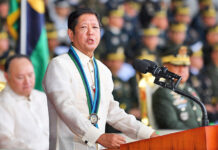LONDON (AFP) – The world must by 2030 slash USD1.8 trillion in annual subsidies that destroy the environment, to “finance a net-zero global economy”, according to a study on Thursday from business groups including one founded by tycoon Richard Branson.
The report, estimating the value of damaging state subsidies, was commissioned by Branson’s nonprofit initiative The B Team and global coalition Business for Nature, which comprises academic, corporate and environmental organisations.
The vast subsidies, totalling two per cent of global gross domestic product, fund the “global destruction of nature” and governments worldwide must act, the two organisations said in a statement.
The study “finds the fossil fuel, agriculture and water industries receive more than 80 per cent of all environmentally harmful subsidies per year”, the organisations concluded.
And they called upon governments to “redirect, repurpose or eliminate” those subsidies by 2030 to help “finance a net-zero global economy”.

At least 20 nations were subsidising the price of gasoline or petrol, sparking higher emissions of carbon and other dangerous air pollutants, the research suggested.
Governments across the world pay an estimated USD640 billion in support to the fossil fuel industry, contributing to climate change, air and water pollution and land subsidence, the study found.
Agriculture receives some USD520 billion in subsidies that contribute towards soil erosion, water pollution, deforestation, greenhouse gas emissions and loss of biodiversity and natural habitats, it claimed.
And another USD350 billion in subsidies for the water industry is said to help fund water pollution and risk ocean and waterway ecosystems.
Figures said that “harmful subsidies must be redirected towards protecting the climate and nature, rather than financing our own extinction”.



















































